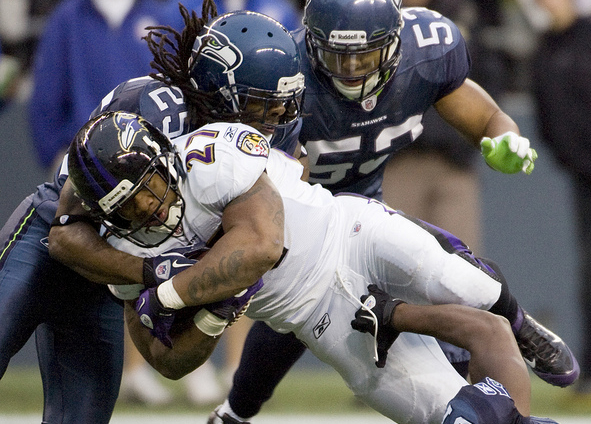Football Freakonomics: Tackling the Old Defense-Wins-Championship Cliche
The following is a cross-post from our Football Freakonomics project at NFL.com. Check out the interactive graphic and, at the end of this post, the video.
We all know the cliché. Go ahead, put on your best John Facenda voice and say it with us:
DEFENSE. WINS. CHAMPIONSHIPS.
What’s that even supposed to mean? That defense is more important during the playoffs than the regular season? That defense is generally more important than the offense?
Or is the saying maybe the collective echo of some grizzled defensive coordinator in a long-ago championship game, trying to fire up his troops during halftime? “Men, you and I know that our teammates on offense are good men, tough men, talented men. And they helped get us here. But let me be clear, gentlemen: DEFENSE WINS CHAMPIONSHIPS!”
Whatever the case, the cliché is very much alive and well — even this year, when the Giants and Patriots made it to the Super Bowl teams while ranking 27th and 31st, respectively, in total regular-season defense.
So we took a look at the numbers, putting together a collage of evidence about whether defense is in fact disproportionately important in championship football.
We leaned on the research of Brian Burke at Advanced NFL Stats, who finds that elite offenses historically outperform elite defenses.
We also leaned on the research of Tobias J. Moskowitz and L. Jon Wertheim, the authors of Scorecasting. They looked at data from Super Bowls as well as 10,000-plus regular-season games, and similarly found the cliché to be unsupportable.
But wait, there’s more!
As you can see in the graphic, scoring is much higher in Super Bowls than in regular-season games. Over the past 10 seasons, Super Bowl teams have each scored 25.3 points per game, compared to 20.5 points per game during the regular season; and the winning Super Bowl teams have averaged 31.6 points per game. (Kind of seems like an argument for a new cliché, doesn’t it – OFFENSE. WINS. CHAMPIONSHIPS!)
One more small wrinkle to consider, also portrayed in the graphic: the team that leads the league in defensive touchdowns during the regular season tends to have … yes, a really bad won-loss record.
So why does the cliché live on?
One explanation may be that truly great defenses (the 1985 Bears, the 2000 Ravens, the 2002 Buccaneers, for instance) are so breathtaking (in a suffocate-your-opponent kind of way) that they stand out in our memory, the way any big anomalous event tends to stand out.
Here’s another fascinating explanation, courtesy of Moscowitz and Wertheim:
If defense is no more critical to winning than offense is, why does everyone from Little League coaches to ESPN analysts extoll its importance? Well, no one needs to talk up the virtues of scoring. No one needs to create incentives for players to score more touchdowns. There’s a reason why fans exhort “DEE-fense, DEE-fense!” not “O-ffense, O-ffense!” Offense is fun. Offense is glamorous. Who gets the Nike shoe contracts and the other endorsements — the players who score or the defensive stoppers?
Let’s not kid ourselves. No matter how great your offense is, of course you want a great defense to go along with it. But the idea that a great defense is some magic bullet – able to transcend gravity, logic, and time – is something we should probably stick in the drawer. Unless, of course, you’re the grizzled old coach who invented the cliché. It is a catchy saying, and you, sir, are entitled to use it forever, untrue as it may be.


Comments